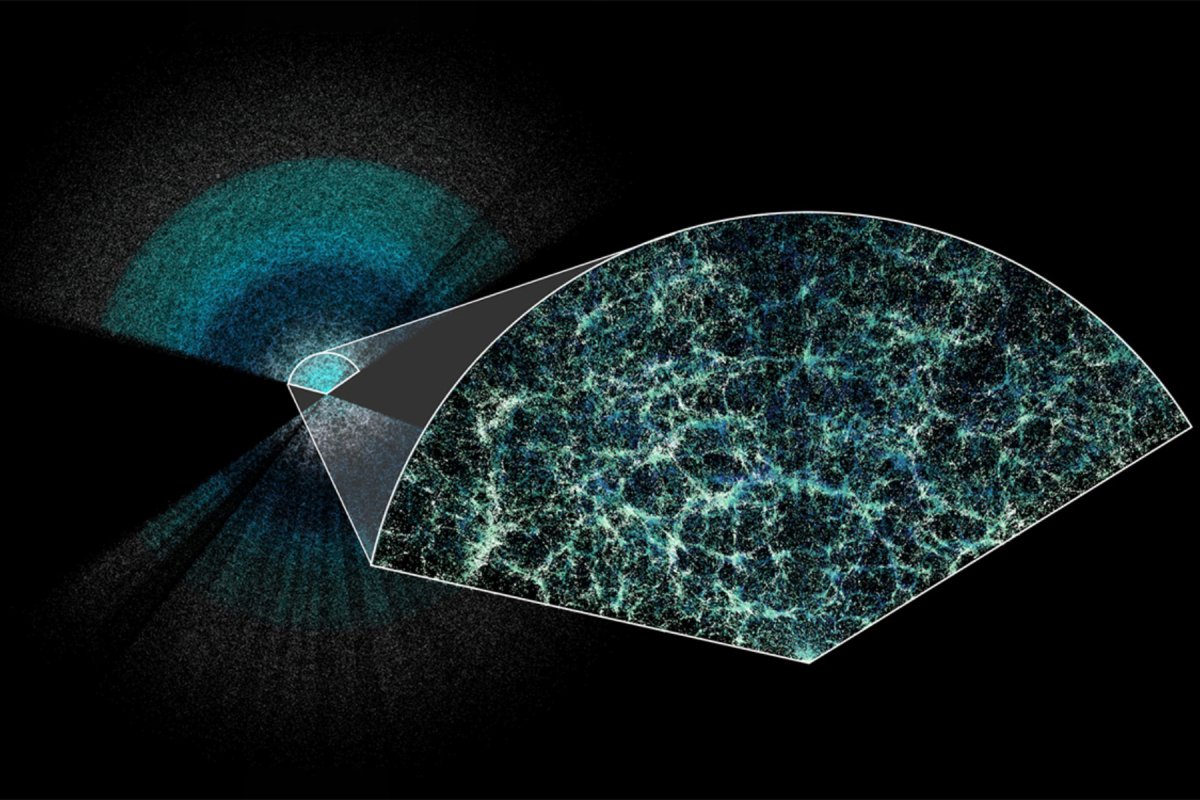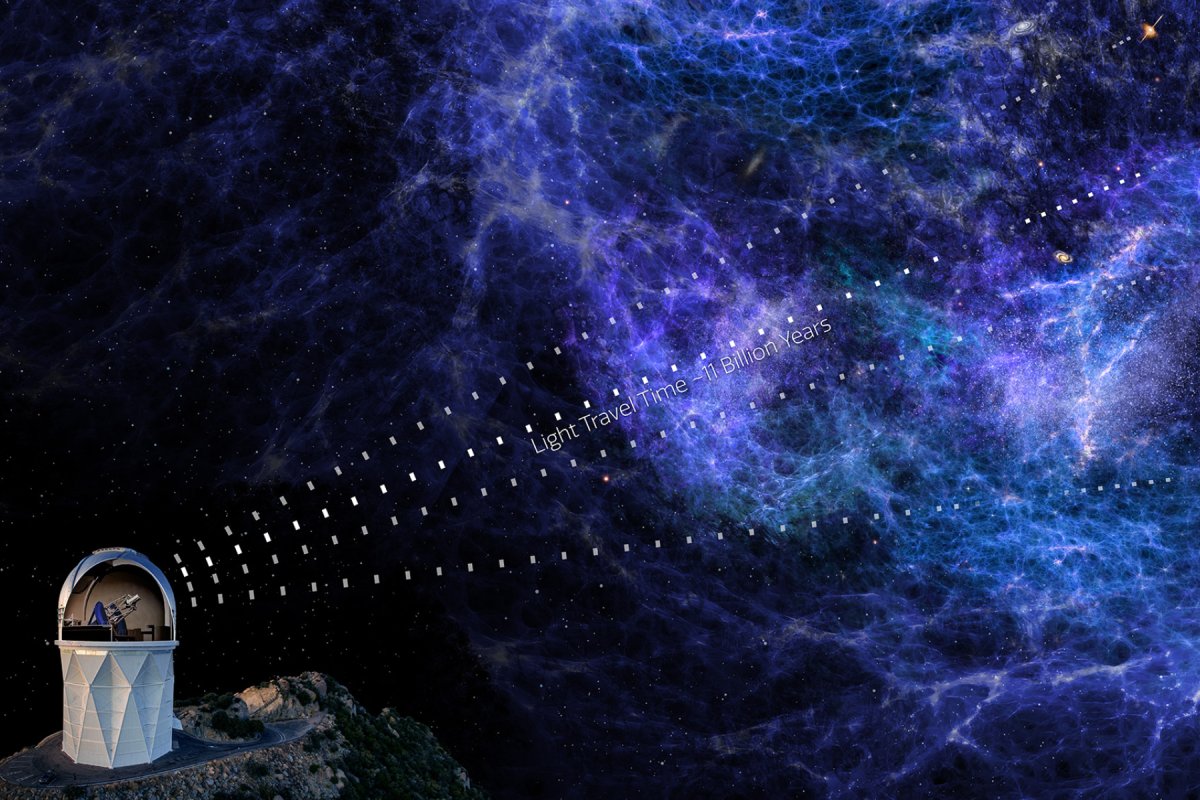An enormous map of the universe and how it's changed over time has been made by scientists, and may change how we think about the cosmos and its expansion.
This map, made using data gathered by the Dark Energy Spectroscopic Instrument (DESI), is the largest and most detailed map made to date, and indicates that the effect of dark energy on the universe may be different from what we first thought.
The effects of dark energy on the universe may have changed over time, which could shake up how scientists view the universe, according to new research due to be presented at the April 4 meeting of the American Physical Society in California.

The DESI is an international collaboration, situated at the U.S. National Science Foundation's Nicholas U. Mayall Telescope at Kitt Peak National Observatory in Arizona. DESI allowed astronomers to observe the universe, looking up to 11 billion years into the past, and create this huge 3D map of the cosmos. This enabled the scientists to measure how the universe expanded in its early days.
The universe is expanding, with objects moving apart from each other in space at an accelerated rate. The current model of the universe, known as Lambda CDM, explains this acceleration as a dance between matter—both normal matter and dark matter—slowing expansion down, and dark energy speeding the expansion up.
Around 27 percent of the known universe is thought to be comprised of dark matter, and 68 percent is dark energy, while only about 5 percent is made up of "normal" matter.
"Gravity pulls matter together, so that when we throw a ball in the air, the Earth's gravity pulls it down toward the planet," Mustapha Ishak-Boushaki, a professor of physics in the School of Natural Sciences and Mathematics (NSM) at UT Dallas, and member of the DESI collaboration, said in a statement. "But at the largest scales, the universe acts differently. It's acting like there is something repulsive pushing the universe apart and accelerating its expansion. This is a big mystery, and we are investigating it on several fronts. Is it an unknown dark energy in the universe, or is it a modification of Albert Einstein's theory of gravity at cosmological scales?"
DESI's data, however, shows that the universe may have evolved in a way that isn't quite consistent with the Lambda CDM model, indicating that the effects of dark energy on the universe may have changed since the early days of the cosmos.
"Our results show some interesting deviations from the standard model of the universe that could indicate that dark energy is evolving over time," Ishak-Boushaki said. "The more data we collect, the better equipped we will be to determine whether this finding holds. With more data, we might identify different explanations for the result we observe or confirm it. If it persists, such a result will shed some light on what is causing cosmic acceleration and provide a huge step in understanding the evolution of our universe."
This map was created only using DESI's first year of data: the astronomers hope to gather even more over the coming years, and create a map that is even more detailed and accurate.
"No spectroscopic experiment has had this much data before, and we're continuing to gather data from more than a million galaxies every month," Nathalie Palanque-Delabrouille, a Berkeley Lab scientist and project collaborator, said in a statement. "It's astonishing that with only our first year of data, we can already measure the expansion history of our universe at seven different slices of cosmic time, each with a precision of 1 to 3 percent. The team put in a tremendous amount of work to account for instrumental and theoretical modeling intricacies, which gives us confidence in the robustness of our first results."

The astronomers hope to use DESI to map 3 million quasars and 37 million galaxies by the end of the 5-year project.
"The dataset we are collecting is exceptional, as is the rate at which we are gathering it. This is the most precise measurement I have ever done in my life," Julien Guy, a scientist at Berkeley Lab and the co-lead for processing information from DESI's spectrographs, said in the statement.
"We are in the golden era of cosmology, with large-scale surveys ongoing and about to be started, and new techniques being developed to make the best use of these datasets," Arnaud de Mattia, a researcher with the French Alternative Energies and Atomic Energy Commission (CEA) and co-leader of DESI's group interpreting the cosmological data, agreed. "We're all really motivated to see whether new data will confirm the features we saw in our first-year sample and build a better understanding of the dynamics of our universe."
This research is yet to be peer-reviewed, however, and is due to be uploaded to the pre-print server arXiv after the American Physical Society meeting.
Do you have a tip on a science story that Newsweek should be covering? Do you have a question about dark energy? Let us know via science@newsweek.com.
Uncommon Knowledge
Newsweek is committed to challenging conventional wisdom and finding connections in the search for common ground.
Newsweek is committed to challenging conventional wisdom and finding connections in the search for common ground.
About the writer
Jess Thomson is a Newsweek Science Reporter based in London UK. Her focus is reporting on science, technology and healthcare. ... Read more
To read how Newsweek uses AI as a newsroom tool, Click here.






